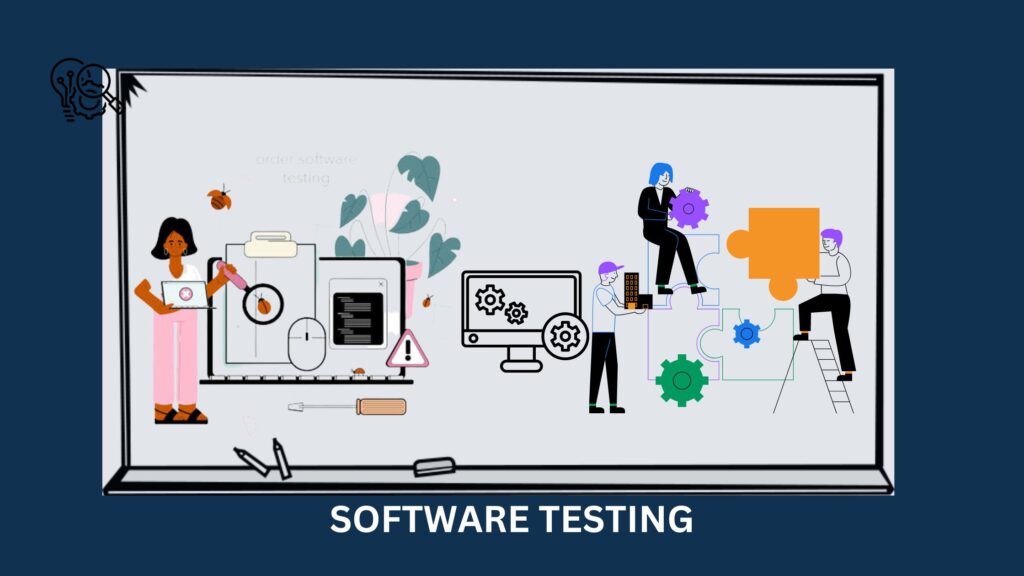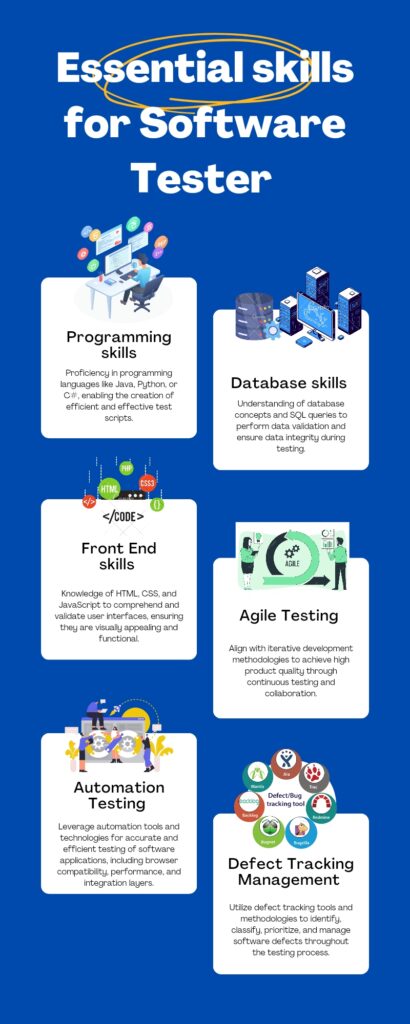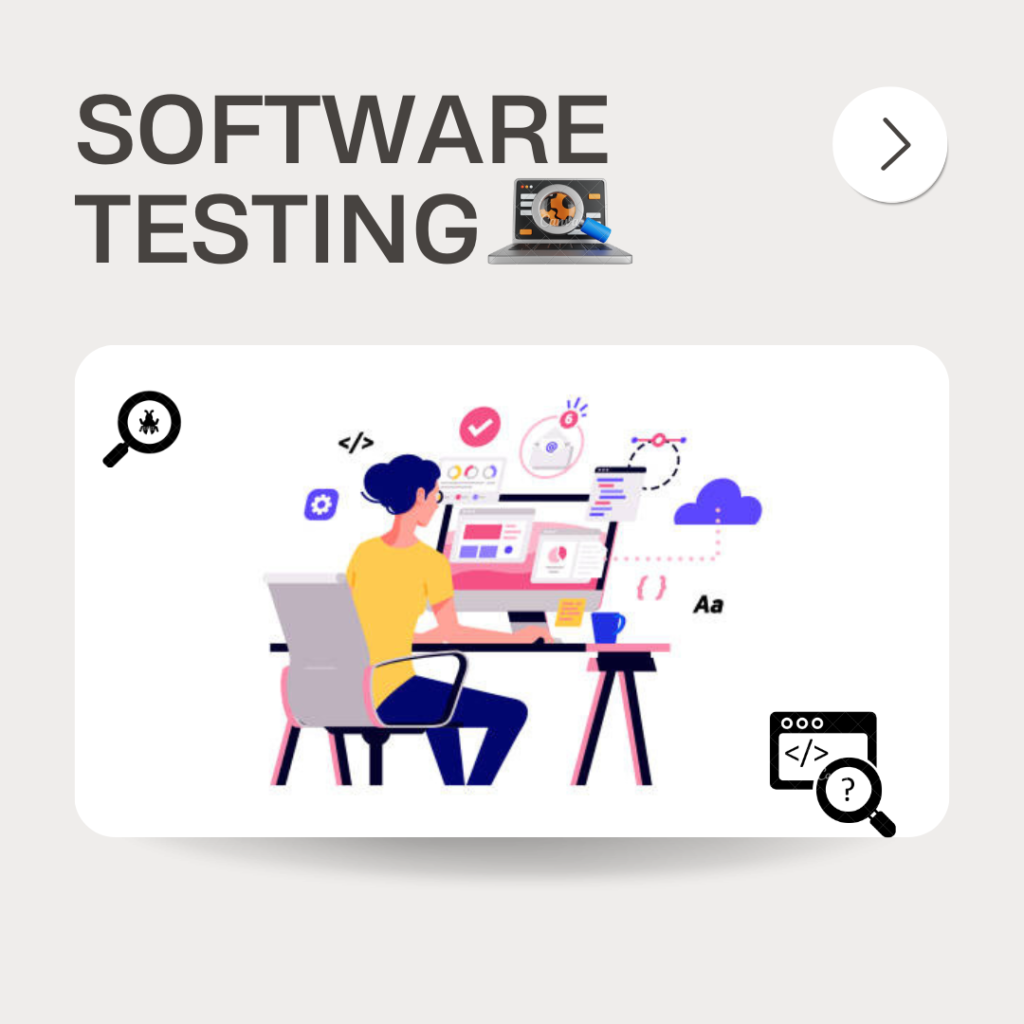Introduction
Are you intrigued by the world of software, quality assurance, and problem-solving? If so, a career in software testing might be your ideal professional journey. In this blog post, we will explore the fascinating world of software testing and unveil the exciting path to a successful career in this dynamic field.
- What is Software Testing?
- Career in Software Testing
- Guide to Kickstart Your Software Testing Career
- Educational Path to Becoming a Software Testing Engineer
- High School Education
- Bachelor’s Degree (Optional, but Highly Recommended)
- Online Courses and Certifications
- Learn Programming and Scripting
- A Day in the Life of a Software Testing Engineer
- Bug Identification and Reporting
- Test Documentation
- How is artificial intelligence affecting Software Testing jobs?
- List out AI-powered Software Testing tools or framework
- Conclusion
- Frequently Asked Questions
What is Software Testing?
Imagine you’re building a magnificent skyscraper. Before the grand opening, it’s crucial to ensure that every nut, bolt, and beam is in perfect condition. The same concept applies to software. Software testing is the meticulous process of evaluating a software application to identify and fix any issues or defects before it reaches the end-users. In essence, software testers are the quality assurance experts who ensure that software works flawlessly and meets the user’s expectations.

Career in Software Testing
1. High Demand for Software Testers
In today’s technology-driven world, software is everywhere. From mobile apps to web platforms and autonomous vehicles, software is the backbone of modern life. As a result, there is a consistently high demand for skilled software testers across various industries, making it a secure and stable career choice.
2. Constant Learning and Growth
The field of software testing is ever-evolving. New technologies, development methodologies, and testing tools emerge regularly. This means that as a software tester, you’ll have the opportunity to continually learn and grow, ensuring that your job remains engaging and intellectually stimulating.
3. Problem-solving and Attention to Detail
Software testers play a vital role in ensuring the functionality and reliability of software products. They identify and fix issues that may impact user experience or security. If you’re someone who enjoys solving puzzles, pays meticulous attention to detail, and thrives on challenges, software testing is the perfect fit for you.
Guide to Kickstart Your Software Testing Career
Now that you’re excited about the prospects of a software testing career, let’s dive into the steps to launch your journey.
1. Education and Training
Begin by acquiring the necessary knowledge and skills. Many universities and online platforms offer courses and certifications in software testing. Consider enrolling in these programs to build a solid foundation in the field.
2. Learn Programming and Coding
While not always mandatory, having a basic understanding of programming languages is highly beneficial for a software tester. Familiarity with coding allows you to better understand the software’s architecture and pinpoint potential issues.
3. Master Testing Tools
Software testing involves various tools for test automation, defect tracking, and performance testing. Familiarize yourself with popular tools like Selenium, JIRA, and LoadRunner to enhance your skill set.
4. Gain Practical Experience
Practice makes perfect. Apply your knowledge by working on real-world projects. Consider internships or entry-level positions to gain valuable hands-on experience.
5. Continuous Learning
Stay updated with the latest trends and developments in software testing by attending conferences, webinars, and workshops. Networking with industry professionals can also provide valuable insights and opportunities.
Educational Path to Becoming a Software Testing Engineer
High School Education
Bachelor’s Degree (Optional, but Highly Recommended)
While not mandatory, pursuing a bachelor’s degree in a relevant field can significantly boost your career prospects. Consider degrees in:
- Computer Science: Provides a comprehensive understanding of software development and testing methodologies.
- Information Technology: Focuses on practical IT skills, including software testing and quality assurance.
- Engineering: Offers a broader perspective on problem-solving and critical thinking, which are valuable in software testing.
Online Courses and Certifications
Supplement your formal education with online courses and certifications, which allow you to dive deep into software testing techniques and tools. Highly recommended courses include:
- ISTQB Certification: The International Software Testing Qualifications Board (ISTQB) certification is globally recognized and covers the fundamentals of software testing.
- Certified Software Tester (CSTE) by the Quality Assurance Institute.
- Certified Agile Tester (CAT) for those interested in Agile testing methodologies.
- Vendor-specific certifications for tools like Selenium, JIRA, or HP Quality Center (now Micro Focus ALM).
- Udemy’s Software Testing Courses: Udemy offers a variety of courses, from beginner to advanced levels, covering topics like automation testing, test management, and more.
- Coursera’s Software Testing Specialization: Coursera offers a specialization program that covers software testing principles, techniques, and test automation.

Learn Programming and Scripting
Understanding programming languages and scripting is invaluable for a software tester. Familiarize yourself with:
- Java: Widely used in test automation, Java is a great language to start with.
- Python: Known for its simplicity and versatility, Python is another popular choice for scripting in testing.
External Links suggestion: https://www.istqb.org/
https://www.udemy.com/courses/search/?q=software+testing

A Day in the Life of a Software Testing Engineer

Ever wondered what it’s like to be a software testing engineer? This role is critical in ensuring the quality and functionality of software products before they reach users. Let’s take a peek into a typical day in the life of a software testing engineer to get a better understanding.
Morning Routine
Reviewing the Test Plan
The day usually starts by reviewing the test plan and any updates or changes made since the previous day. This plan outlines what needs to be tested, including specific test cases and objectives.
Daily Standup Meeting
Software testing teams often have daily standup meetings where team members discuss progress, challenges, and plans for the day. It’s a quick but crucial opportunity to align everyone’s efforts.
Test Case Execution
With the plan in mind, the testing engineer starts executing test cases. This involves running the software, inputting data, and comparing the actual results with expected outcomes. Various testing types, such as functional, regression, and usability testing, may be performed.
Afternoon Activities
Bug Identification and Reporting
When issues or defects are discovered during testing, the engineer meticulously documents them. This includes describing the problem, steps to reproduce it, and any relevant screenshots or logs. Clear and detailed reporting is essential for developers to understand and fix the issues.
Test Environment Setup
Ensuring that the test environment is set up correctly is essential. This includes configuring hardware, software, and network settings to mimic real-world conditions as closely as possible.
Late Afternoon and Wrap-Up
Test Documentation
As the day winds down, the testing engineer updates test documentation, including test cases and test results. Accurate records are vital for future reference and for maintaining the quality of the software.
Collaborating with Developers
Effective communication with developers is key. If defects are found, the testing engineer collaborates with developers to clarify issues and assist in resolving them. This collaboration fosters a team-oriented approach to software quality.
Additional Responsibilities
While the above activities form the core of a software testing engineer’s day, some additional responsibilities and tasks may arise:
- Test Automation: Some engineers work on creating and maintaining automated test scripts, which can significantly speed up the testing process.
- Performance Testing: On certain projects, engineers may focus on performance testing, ensuring that the software can handle the expected load and functions efficiently.
- Exploratory Testing: In addition to planned test cases, exploratory testing involves creative and unscripted testing to uncover unexpected issues.
- Regression Testing: After code changes are made, testing engineers often conduct regression testing to ensure that new modifications haven’t introduced new problems.
How is artificial intelligence affecting Software Testing jobs?
Artificial Intelligence (AI) is having a profound impact on the field of software testing, transforming the way testing is conducted and the roles of software testing professionals. Here’s a look at how AI is affecting software testing jobs:
Test Automation: AI-powered tools and frameworks are automating test case generation, execution, and maintenance. This reduces the manual effort required for repetitive tasks, leading to increased efficiency and faster test cycles. Test automation engineers play a crucial role in creating and maintaining these AI-driven test scripts.
Enhanced Test Coverage: AI algorithms can identify complex patterns and generate test scenarios that humans might overlook. Testers need to collaborate with AI systems to ensure comprehensive test coverage and maintain a balance between automated and manual testing.
Faster Defect Detection: AI can analyze vast datasets in real time, allowing for quicker detection of defects and issues. This accelerates the debugging and issue resolution process. Testers play a pivotal role in interpreting AI-generated insights and verifying the identified issues.
AI-Powered Test Maintenance: AI-driven tools can adapt test scripts when software changes occur, reducing the maintenance overhead on testers. However, testers must still oversee these automated processes to ensure that they align with the evolving requirements.
Test Data Generation: AI can generate diverse and realistic test data, improving the quality of tests. Testers work alongside AI to validate the appropriateness of generated data and its relevance to test scenarios.
Performance Testing: AI can simulate realistic user loads and behaviors, making performance testing more accurate and efficient. Performance testers utilize AI-based tools to analyze and optimize system performance.
Shift-Left Testing: AI encourages the adoption of “shift-left” testing practices, where testing begins earlier in the development lifecycle. Testers collaborate with developers to integrate testing seamlessly into the development process.

AI Test Oracles: AI can be used to create test oracles, which are automated mechanisms that determine whether a test has passed or failed based on predefined criteria. Testers define the criteria and validate AI-generated results.
Focus on Exploratory Testing: As AI takes over repetitive testing tasks, human testers can focus more on exploratory testing, where they simulate user behavior, think creatively, and uncover unexpected issues that AI might miss.
Continuous Learning: Testers need to upskill to effectively work with AI tools and technologies. Understanding AI concepts, data analysis, and machine learning principles becomes essential for testers.
Human Oversight: While AI can streamline many aspects of testing, human oversight remains critical. Testers are responsible for setting AI objectives, ensuring ethical AI use, and validating the relevance and accuracy of AI-generated results.
Communication and Collaboration: Testers increasingly collaborate with AI experts and data scientists to harness AI’s full potential. Effective communication and collaboration skills are crucial in this evolving landscape.
In summary, AI is reshaping software testing by automating repetitive tasks, enhancing test coverage, and accelerating defect detection. However, the role of software testing professionals is far from obsolete. Testers will continue to be essential in defining test objectives, validating AI-generated insights, ensuring ethical AI use, and conducting exploratory testing. Adaptation and continuous learning are key for testers to thrive in this AI-powered era of software testing.
List out AI-powered Software Testing tools or framework
Test.ai: Test.ai offers an AI-powered testing tool called “Appium AI” that uses machine learning to create and execute test cases for mobile applications.
Applitools: Applitools uses AI and visual testing to identify and report visual UI differences across different versions of a software application.
Mabl: Mabl is an intelligent test automation platform that uses AI to create, run, and maintain end-to-end tests for web applications.
Testim: Testim is an AI-driven test automation platform that uses machine learning to create and maintain stable and efficient test scripts.
ReTest: ReTest is an AI-driven regression testing tool that automatically generates and maintains test cases for web applications.
Function: Functionize offers a cloud-based AI testing platform that uses natural language processing and machine learning to create and execute tests for web applications.
TestCraft: TestCraft is a test automation platform that uses AI to build and maintain Selenium-based test scripts for web applications.
Sauce Labs: Sauce Labs offers an AI-driven continuous testing platform that uses machine learning to improve test stability and reduce false positives.
Applitool’s Visual AI: Applitool’s Visual AI uses AI to automatically validate the visual appearance of web and mobile applications across different devices and screen sizes.
Eggplant (formerly TestPlant): Eggplant provides AI-driven testing and monitoring solutions for a range of platforms, including mobile, desktop, and web applications.
TestProject: TestProject is a free test automation platform that incorporates AI to help testers create and execute tests for web and mobile applications.
Tricentis Tosca: Tricentis Tosca uses AI for test automation and continuous testing, enabling testers to create and maintain test cases efficiently.
These AI-powered testing tools and frameworks leverage machine learning, computer vision, and natural language processing to enhance test automation, reduce manual effort, and improve the overall quality of software testing. Choosing the right tool depends on the specific needs and requirements of your testing projects.
To learn more about other careers https://futurereadytools.com/category/careers/ check out this website.
Conclusion
A career in software testing is within your reach! By following this educational path, you’ll acquire the knowledge and skills needed to excel in this exciting field. Remember, continuous learning and practical experience are the keys to becoming a sought-after software tester. So, embrace the journey, stay curious, and watch your career flourish in the world of software testing.
Frequently Asked Questions
- What is software testing?
A. Software testing is the process of evaluating a software product to find errors or defects. It is an important part of the software development lifecycle and helps to ensure that the software is reliable and meets the needs of its users.
2. What are the different types of software testing?
A. There are many different types of software testing, but some of the most common include:
- Unit testing: This is the testing of individual units of code.
- Integration testing: This is the testing of how different units of code interact with each other.
- System testing: This is the testing of the entire software system.
- Acceptance testing: This is the testing of the software by the customer or end user.
- Performance testing: This is the testing of the software’s performance under load.
- Security testing: This is the testing of the software’s security against attacks.
3. What are the skills required for a career in software testing?
A. The skills required for a career in software testing vary depending on the specific role, but some of the most important skills include:
- Analytical skills: The ability to identify and troubleshoot problems.
- Problem-solving skills: The ability to think creatively and come up with solutions to problems.
- Communication skills: The ability to communicate effectively with both technical and non-technical audiences.
- Attention to detail: The ability to spot errors and defects.
- Test case design skills: The ability to create test cases that effectively test the software.
- Automation testing skills: The ability to automate test cases.
4. What is the salary range for software testers?
A. The salary range for software testers varies depending on experience, location, and skillset.
5. What is the job outlook for software testing?
A. The job outlook for software testing is very good. The Bureau of Labor Statistics projects that the employment of software testers is projected to grow 22 percent from 2020 to 2030, much faster than the average for all occupations. This growth is due to the increasing demand for software testing services in the IT industry.
6. How do I get started in a career in software testing?
A. There are a few different ways to get started in a career in software testing. One way is to get a degree in software engineering or computer science. Another way is to get certified as a software tester. There are many different certifications available, such as the Certified Software Tester (CST) certification offered by the ISTQB.
7. What are the different career paths in software testing?
There are many different career paths in software testing. Some of the most common career paths include:
- Software tester: A software tester is responsible for testing software to find errors or defects.
- Test lead: A test lead is responsible for managing a team of software testers.
- Test manager: A test manager is responsible for the overall testing process for a software project.
- Quality assurance engineer (QA engineer): A QA engineer is responsible for ensuring the quality of software products.
- Automation engineer: An automation engineer is responsible for automating test cases.
8. What are the challenges of a career in software testing?
A. Some of the challenges of a career in software testing include:
- The work can be repetitive and tedious.
- The software can be complex and difficult to test.
- The deadlines can be tight.
- The work can be stressful.
9. What are the rewards of a career in software testing?
A. Some of the rewards of a career in software testing include:
- The work can be challenging and intellectually stimulating.
- You can help to ensure that software products are reliable and meet the needs of users.
- You can work on a variety of projects and with different technologies.
- The job outlook is good.
10. How Can I stay up-to-date in the field of software testing?
A. There are a few different ways to stay up-to-date in the field of software testing. One way is to attend conferences and training workshops. Another way is to read industry publications and blogs. You can also join online communities and forums for software testers.

